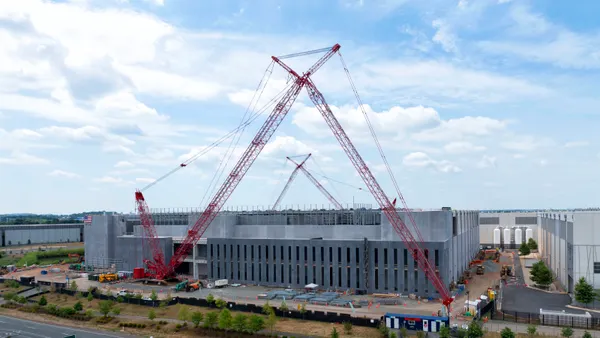Dive Brief:
- According to an Associated Builders and Contractors (ABC) analysis of information provided by the U.S. Bureau of Labor Statistics (BLS), March construction material prices increased month over month by 0.8%. On a year-over-year basis, the price of construction materials increased 5.8%. Crude petroleum (5%), iron and steel (2.3%), softwood lumber (2.2%) and concrete products (2.2%) saw the biggest price increases since February, while natural gas (-32.1%) and unprocessed energy materials (-11.6%) had the largest month-over-month declines.
- Nonresidential construction material prices also increased — up 0.9% since February and 5.6% between March 2017 and March 2018. Year-over-year, of all the categories the BLS tracks, only natural gas prices dropped (-12.8%). Natural gas (34%), softwood lumber (16.3%), unprocessed energy materials (8.6%) and iron and steel (6.5%) saw the biggest year-over-year increases.
- The true March increase of material prices, said Anirban Basu, chief economist for the ABC, was hidden to some extent by the large drop in natural gas. He added that the industry can expect higher steel prices in the near future as end users and suppliers negotiate new pricing agreements that include the tariff imposed by the Trump administration. Rising wages and material prices, even though contractors are enjoying record work backlog, will likely constrain profit margin growth.
Dive Insight:
This is the latest round of evidence that the steel and aluminum tariffs, 25% and 10% respectively, have the potential to hinder construction industry profits. Given the labor shortage and the resulting wage increases, as well as the pre-tariff rising of material prices, the extra duties imposed by the U.S. government constitute a sort of "piling on" for many contractors. Some of the big questions are how much of these costs can contractors absorb, and how much can construction companies pass on to their customers before the higher cost of building starts to see projects shelved or abandoned.
Granted, that is a worst-case scenario, but industry groups like the Associated General Contractors of America (AGC) have warned the administration that steel and aluminum are so widely used in building and infrastructure projects that the tariffs could, in fact, force project delays and even cancellations. In addition, the AGC's chief economist, Ken Simonson, said in a press release that both U.S. steel mills and the nation's trucking industry are short on capacity, which will likely lead to price increases and delivery delays in the coming months as domestic steel production ramps up.












